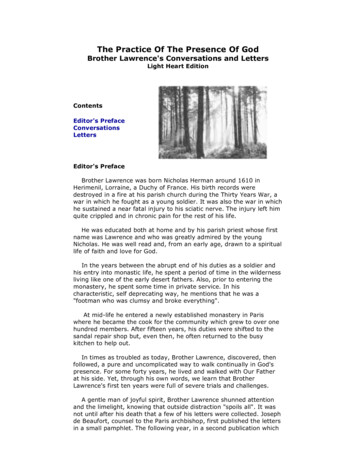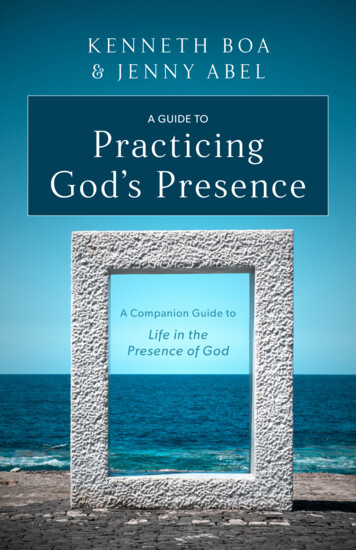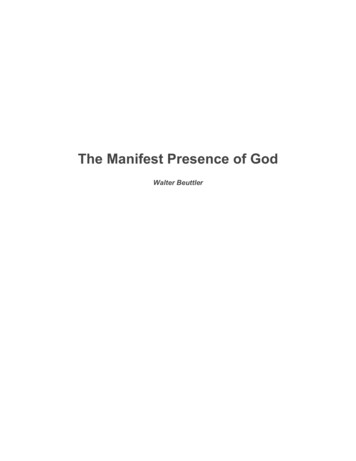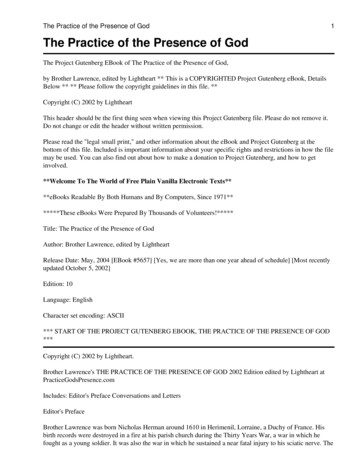
Transcription
The Practice Of The Presence Of GodBrother Lawrence's Conversations and LettersLight Heart EditionContentsEditor's PrefaceConversationsLettersEditor's PrefaceBrother Lawrence was born Nicholas Herman around 1610 inHerimenil, Lorraine, a Duchy of France. His birth records weredestroyed in a fire at his parish church during the Thirty Years War, awar in which he fought as a young soldier. It was also the war in whichhe sustained a near fatal injury to his sciatic nerve. The injury left himquite crippled and in chronic pain for the rest of his life.He was educated both at home and by his parish priest whose firstname was Lawrence and who was greatly admired by the youngNicholas. He was well read and, from an early age, drawn to a spirituallife of faith and love for God.In the years between the abrupt end of his duties as a soldier andhis entry into monastic life, he spent a period of time in the wildernessliving like one of the early desert fathers. Also, prior to entering themonastery, he spent some time in private service. In hischaracteristic, self deprecating way, he mentions that he was a"footman who was clumsy and broke everything".At mid-life he entered a newly established monastery in Pariswhere he became the cook for the community which grew to over onehundred members. After fifteen years, his duties were shifted to thesandal repair shop but, even then, he often returned to the busykitchen to help out.In times as troubled as today, Brother Lawrence, discovered, thenfollowed, a pure and uncomplicated way to walk continually in God'spresence. For some forty years, he lived and walked with Our Fatherat his side. Yet, through his own words, we learn that BrotherLawrence's first ten years were full of severe trials and challenges.A gentle man of joyful spirit, Brother Lawrence shunned attentionand the limelight, knowing that outside distraction "spoils all". It wasnot until after his death that a few of his letters were collected. Josephde Beaufort, counsel to the Paris archbishop, first published the lettersin a small pamphlet. The following year, in a second publication which
he titled, 'The Practice of the Presence of God', de Beaufort included,as introductory material, the content of four conversations he had withBrother Lawrence.In this small book, through letters and conversations, BrotherLawrence simply and beautifully explains how to continually walk withGod - not from the head but from the heart. Brother Lawrence left thegift of a way of life available to anyone who seeks to know God's peaceand presence; that anyone, regardless of age or circumstance, canpractice -anywhere, anytime. Brother Lawrence also left the gift of adirect approach to living in God's presence that is as practical today asit was three hundred years ago.Brother Lawrence died in 1691, having practiced God's presence forover forty years. His quiet death was much like his monastic life whereeach day and each hour was a new beginning and a fresh commitmentto love God with all his heart.Light oduction: At the time of de Beaufort's interviews, BrotherLawrence was in his late fifties. Joseph de Beaufort later commentedthat the crippled brother, who was then in charge of the upkeep ofover one hundred pairs of sandals, was "rough in appearance butgentle in grace". This comment was originally made by another churchofficial who had taken note of Brother Lawrence's simple and gentleapproach to living in God's presence.First Conversation: The first time I saw Brother Lawrence was on the3rd of August, 1666. He told me that God had done him a singularfavor in his conversion at the age of eighteen. During that winter,upon seeing a tree stripped of its leaves and considering that, within alittle time, the leaves would be renewed and, after that, the flowersand fruit appear; Brother Lawrence received a high view of theprovidence and power of God which has never since been effaced fromhis soul. This view had perfectly set him free from the world andkindled in him such a love for God, that he could not tell whether ithad increased in the forty years that he had lived since.Brother Lawrence said he had been footman to M. Fieubert, thetreasurer, and that he was a great awkward fellow who brokeeverything. He finally decided to enter a monastery thinking that hewould there be made to smart for his awkwardness and the faults hewould commit, and so he would sacrifice his life with its pleasures toGod. But Brother Lawrence said that God had surprised him becausehe met with nothing but satisfaction in that state.Brother Lawrence related that we should establish ourselves in a senseof God's presence by continually conversing with Him. It was ashameful thing to quit His conversation to think of trifles and fooleries.
We should feed and nourish our soul with high notions of God whichwould yield us great joy in being devoted to Him.He said we ought to quicken and enliven our faith. It was lamentablewe had so little. Instead of taking faith for the rule of their conduct,men amused themselves with trivial devotions which changed daily.He said that faith was sufficient to bring us to a high degree ofperfection. We ought to give ourselves up to God with regard both tothings temporal and spiritual and seek our satisfaction only in thefulfilling of His will. Whether God led us by suffering or by consolationall would be equal to a soul truly resigned.He said we need fidelity in those disruptions in the ebb and flow ofprayer when God tries our love to Him. This was the time for acomplete act of resignation, whereof one act alone could greatlypromote our spiritual advancement.He said that as far as the miseries and sins he heard of daily in theworld, he was so far from wondering at them, that, on the contrary, hewas surprised there were not more, considering the malice sinnerswere capable of. For his part, he prayed for them; but knowing thatGod could remedy the mischief they did when He pleased, he gavehimself no further trouble.Brother Lawrence said to arrive at such resignation as God requires,we should carefully watch over all the passions that mingle in spiritualas well as temporal things. God would give light concerning thosepassions to those who truly desire to serve Him.At the end of this first conversation Brother Lawrence said that, if mypurpose for the visit was to sincerely discuss how to serve God, Imight come to him as often as I pleased; and without any fear ofbeing troublesome. If this was not the case, then I ought visit him nomore.Second Conversation: Brother Lawrence told me he had always beengoverned by love without selfish views. Since he resolved to make thelove of God the end of all his actions, he had found reasons to be wellsatisfied with his method. He was pleased when he could take up astraw from the ground for the love of God, seeking Him only, andnothing else, not even His gifts.He said he had been long troubled in mind from a certain belief that heshould be damned. All the men in the world could not have persuadedhim to the contrary. This trouble of mind lasted four years, duringwhich time he suffered greatly.Finally he reasoned: I did not engage in a religious life but for the loveof God. I have endeavored to act only for Him. Whatever becomes ofme, whether I be lost or saved, I will always continue to act purely forthe love of God. I shall have this good at least that until death I shallhave done all that is in me to love Him. From that time on BrotherLawrence lived his life in perfect liberty and continual joy. He placedhis sins between himself and God and told Him that he did not deserveHis favors, yet God still continued to bestow them in abundance.
Brother Lawrence said that in order to form a habit of conversing withGod continually and referring all we do to Him, we must, at first, applyto Him with diligence. Then, after a little care, we would find His loveinwardly draw us to Him without any difficulty.He expected after the pleasant days God had given him, he wouldhave his turn of pain and suffering. Yet he was not uneasy about it.Knowing that, since he could do nothing of himself, God would not failto give him the strength to bear them.When an occasion of practicing some virtue was offered, he addressedhimself to God saying, "Lord, I cannot do this unless Thou enable me".Then he received strength more than sufficient. When he had failed inhis duty, he only confessed his fault saying to God, "I shall never dootherwise, if You leave me to myself. It is You who must hinder myfailing and mend what is amiss." Then, after this, he gave himself nofurther uneasiness about it.Brother Lawrence said we ought to act with God in the greatestsimplicity, speaking to Him frankly and plainly, and imploring Hisassistance in our affairs just as they happen. God never failed to grantit, as Brother Lawrence had often experienced.He said he had been lately sent into Burgundy to buy the provision ofwine for the community. This was a very unwelcome task for himbecause he had no turn for business and because he was lame andcould only move around the boat by rolling himself over the casks. Yethe gave himself no uneasiness about it, nor about the purchase of thewine. He said to God, it was His business he was about, and that heafterwards found it very well performed. He mentioned that it hadturned out the same way the year before when he was sent toAuvergne.So, likewise, in his work in the kitchen (to which he had, at first, agreat aversion), having accustomed himself to do everything there forthe love of God and asking for His grace to do his work well, he hadfound everything easy during the fifteen years he had been employedthere. He was very well pleased with the post he was now in. Yet, hewas as ready to quit that as the former, since he tried to please Godby doing little things for the love of Him in any work he did. With himthe set times of prayer were no different from other times. He retiredto pray according to the directions of his superior, but he did not needsuch retirement nor ask for it because his greatest labor did not diverthim from God.Since he knew his obligation to love God in all things, and as heendeavored to do so, he had no need of a director to advise him, buthe greatly needed a confessor to absolve him. He said he was veryaware of his faults, but not discouraged by them. He confessed themto God and made no excuses. Then, he peaceably resumed his usualpractice of love and adoration.In his trouble of mind, Brother Lawrence had consulted no one.Knowing only by the light of faith that God was present, he contented
himself with directing all his actions to Him. He did everything with adesire to please God and let what would come of it.He said that useless thoughts spoil all - that mischief began there. Weought to reject useless thoughts quickly and return to our communionwith God. In the beginning he had often passed his time appointed forprayer in rejecting wandering thoughts and falling right back intothem. He could never regulate his devotion by certain methods assome do. At first, he had practiced meditation but, after some time,that went off in a manner of which he could give no account.Brother Lawrence emphasized that all physical and mental disciplinesand exercises were useless, unless they served to arrive at the unionwith God by love. He had well considered this. He found that theshortest way to go straight to God was by a continual exercise of loveand doing all things for His sake.Also, he noted that there was a great difference between acts of theintellect and acts of the will. Acts of the intellect were comparatively oflittle value. Acts of the will were all important. Our only business wasto love and delight ourselves in God.He then said that all possible kinds of self-sacrifice, if they were void ofthe love of God, could not efface a single sin. Instead, we ought,without anxiety, expect the pardon of our sins from the blood of JesusChrist, endeavoring only to love Him with all our heart. He noted thatGod seemed to have granted the greatest favors to the greatestsinners as more proof of His mercy.Brother Lawrence said the greatest pains or pleasures of this worldwere nothing compared to what he had experienced of both kinds in aspiritual state. As a result he feared nothing, desiring only one thing ofGod - that he might not offend Him. He said he carried no guiltbecause, "When I fail in my duty, I readily acknowledge it, saying, Iam used to do so. I shall never do otherwise if I am left to myself. If Ido not fail, then I immediately give God thanks, acknowledging that itcomes from Him."Third Conversation: Brother Lawrence told me that the foundation ofthe spiritual life in him had been a high notion and esteem of God infaith. When he had once well established his faith he had no other carebut to reject every other thought so he might perform all his actionsfor the love of God. He said when sometimes he had not thought ofGod for a good while he did not disquiet himself. Having acknowledgedhis wretchedness to God, he simply returned to Him with so much thegreater trust.He said the trust we put in God honors Him and draws down His greatgrace. It was impossible not only that God should deceive but that Heshould long let a soul suffer which is perfectly resigned to Him andresolved to endure everything for His sake.Brother Lawrence often experienced the ready succors of Divine Grace.Because of his experience of grace, when he had business to do, hedid not think of it beforehand. When it was time to do it, he found in
God, as in a clear mirror, all that was fit for him to do. When outwardbusiness diverted him a little from the thought of God, a freshremembrance coming from God invested his soul and so inflamed andtransported him that it was difficult for him to contain himself. He saidhe was more united to God in his outward employments than when heleft them for devotion in retirement.Brother Lawrence said that the worst that could happen to him was tolose that sense of God which he had enjoyed so long. Yet the goodnessof God assured him He would not forsake him utterly and that Godwould give him strength to bear whatever evil He permitted to happento him. Brother Lawrence, therefore, said he feared nothing. He hadno occasion to consult with anybody about his state. In the past, whenhe had attempted to do it, he had always come away more perplexed.Since Brother Lawrence was ready to lay down his life for the love ofGod, he had no apprehension of danger.He said that perfect resignation to God was a sure way to heaven, away in which we always have sufficient light for our conduct. In thebeginning of the spiritual life we ought to be faithful in doing our dutyand denying ourselves and then, after a time, unspeakable pleasuresfollowed. In difficulties we need only turn to Jesus Christ and beg Hisgrace with which everything became easier.Brother Lawrence said that many do not advance in Christian progressbecause they stick in penances and particular exercises while theyneglect the love of God which is the end. This appeared plainly by theirworks and was the reason why we see so little solid virtue. He saidthere needed neither art nor science for going to God, but only a heartresolutely determined to apply itself to nothing but Him and to loveHim only.Fourth Conversation: Brother Lawrence spoke with great opennessof heart concerning his manner of going to God. He told me that allconsists in one hearty renunciation of everything which we know doesnot lead to God. We might accustom ourselves to a continualconversation with Him with freedom and in simplicity. We need onlyrecognize God intimately present with us and address ourselves to Himevery moment. We need to beg His assistance for knowing His will inthings doubtful and for rightly performing those things which weplainly see He requires of us, offering them to Him before we do them,and giving God thanks when we have completed them.In our conversation with God we should engage in praising, adoring,and loving Him incessantly for His infinite goodness and perfection.Without being discouraged because of our sins, we should pray for Hisgrace with perfect confidence, relying on the infinite merits of ourLord. Brother Lawrence said that God never failed offering us His graceat each action. It never failed except when Brother Lawrence'sthoughts had wandered from a sense of God's presence, or he forgotto ask His assistance. He said that God always gave us light in ourdoubts when we had no other design but to please Him.Our sanctification did not depend upon changing our works. Instead, itdepended on doing those things for God's sake which we commonly do
for our own. He thought it was lamentable to see how many peoplemistook the means for the end, addicting themselves to certain workswhich they performed very imperfectly because of their human orselfish regard. The most excellent method he had found for going toGod was that of doing our common business without any view ofpleasing men but purely for the love of God.Brother Lawrence felt it was a great delusion to think that the times ofprayer ought to differ from other times. We are as strictly obliged toadhere to God by action in the time of action, as by prayer in its time.His own prayer was simply a sense of the presence of God, his soulbeing at that time aware of nothing other than Divine Love. When theappointed times of prayer were past, he found no difference, becausehe still continued with God, praising and thanking Him with all hismight. Thus his life was a continual joy.Brother Lawrence said we ought, once and for all, heartily put ourwhole trust in God, and make a total surrender of ourselves to Him,secure that He would not deceive us. We ought not weary of doinglittle things for the love of God, who regards not the greatness of thework, but the love with which it is performed. We should not wonder if,in the beginning, we often failed in our endeavors, but that at last weshould gain a habit which will naturally produce its acts in us withoutour effort and to our great delight.The whole substance of religion was faith, hope, and charity. In thepractice of these we become united to the will of God. Everything elseis indifferent and to be used as a means that we may arrive at our endand then be swallowed up by faith and charity. All things are possibleto him who believes. They are less difficult to him who hopes. They aremore easy to him who loves, and still more easy to him whoperseveres in the practice of these three virtues. The end we ought topropose to ourselves is to become, in this life, the most perfectworshippers of God we can possibly be, and as we hope to be throughall eternity.We must, from time to time, honestly consider and thoroughlyexamine ourselves. We will, then, realize that we are worthy of greatcontempt. Brother Lawrence noted that when we directly confrontourselves in this manner, we will understand why we are subject to allkinds of misery and problems. We will realize why we are subject tochanges and fluctuations in our health, mental outlook, anddispositions. And we will, indeed, recognize that we deserve all thepain and labor God sends to humble us.After this, we should not wonder that troubles, temptations,oppositions, and contradictions happen to us from men. We ought, onthe contrary, submit ourselves to them and bear them as long as Godpleases as things highly advantageous to us. The greater perfection asoul aspires after, the more dependent it is upon Divine Grace.Being questioned by one of his own community, to whom he wasobliged to respond, by what means he had attained such an habitualsense of God; Brother Lawrence told him that, since his first coming tothe monastery, he had considered God as the aim and the end of all
his thoughts and desires.In the beginning he spent the hours appointed for private prayer inthinking of God, so as to convince his mind and impress deeply uponhis heart the Divine Existence. He did this by devout sentiments andsubmission to the lights of faith, rather than by studied reasonings andelaborate meditations. By this short and sure method he immersedhimself in the knowledge and love of God. He resolved to use hisutmost endeavor to live in a continual sense of His presence, and, ifpossible, never to forget Him more.When he had thus, in prayer, filled his mind with that Infinite Being,he went to his work in the kitchen where he was then cook for thecommunity. There, having first considered the things his job required,and when and how each thing was to be done; he spent all theintervals of his time, both before and after his work, in prayer.When he began, he said to God with a filial trust, "O my God, sinceThou art with me, and I must now, in obedience to Thy commands,apply my mind to these outward things, grant me the grace tocontinue in Thy Presence; and prosper me with Thy assistance.Receive all my works, and possess all my affections." As he proceededin his work, he continued his familiar conversation with his Maker,imploring His grace, and offering Him all his actions.When he was finished, he examined how he had performed his duty. Ifhe found well, he returned thanks to God. If not, he asked pardon and,without being discouraged, he set his mind right again. He thencontinued his exercise of the presence of God as if he had neverdeviated from it. "Thus," said he, "by rising after my falls, and byfrequently renewed acts of faith and love, I have come to a statewhere it would be as difficult for me not to think of God as it was atfirst to accustom myself to the habit of thinking of Him."As Brother Lawrence had found such an advantage in walking in thepresence of God, it was natural for him to recommend it earnestly toothers. More strikingly, his example was a stronger inducement thanany arguments he could propose. His very countenance was edifyingwith such a sweet and calm devotion appearing that he could not butaffect the beholders.It was observed, that even in the busiest times in the kitchen, BrotherLawrence still preserved his recollection and heavenly-mindedness. Hewas never hasty nor loitering, but did each thing in its turn with aneven, uninterrupted composure and tranquility of spirit. "The time ofwork," said he, "does not with me differ from the time of prayer. Inthe noise and clatter of my kitchen, while several persons are at thesame time calling for different things, I possess God in as great atranquility as if I were upon my knees at the Blessed Supper."LettersIntroduction: Brother Lawrence's letters are the very heart and soulof what is titled 'The Practice of the Presence of God'. All of these
letters were written during the last ten years of his life. Many of themwere to long-time friends, a Carmelite sister and another nun at anearby convent. One or both of these friends were from his nativevillage, perhaps relatives.The first letter was probably written to the prioress of one of theseconvents. The second letter was written to Brother Lawrence's ownspiritual adviser. Note that the fourth letter is written in the thirdperson where Brother Lawrence describes his own experience. Theletters follow the tradition of substituting M for specific names.First Letter: You so earnestly desire that I describe the method bywhich I arrived at that habitual sense of God's presence, which ourmerciful Lord has been pleased to grant me. I am complying with myrequest that you show my letter to no one. If I knew that you wouldlet it be seen, all the desire I have for your spiritual progress wouldnot be enough to make me comply.The account I can give you is: Having found in many books differentmethods of going to God and diverse practices of the spiritual life, Ithought this would serve rather to puzzle me than facilitate what Isought after, which was nothing but how to become wholly God's. Thismade me resolve to give the all for the All.After having given myself wholly to God to make all the satisfaction Icould for my sins, I renounced, for the love of Him, everything thatwas not God; and I began to live as if there was none but He and I inthe world.Sometimes I considered myself before Him as a poor criminal at thefeet of his judge. At other times I beheld Him in my heart as myFather, as my God. I worshipped Him the oftenest I could, keeping mymind in His holy presence and recalling it as often as I found itwandered from Him. I made this my business not only at theappointed times of prayer but all the time; every hour, every minute,even in the height of my work. I drove from my mind everything thatinterrupted my thoughts of God.I found no small pain in this exercise. Yet I continued itnotwithstanding all the difficulties that occurred. I tried not to troubleor disquiet myself when my mind wandered. Such has been mycommon practice ever since I entered religious life. Though I havedone it very imperfectly, I have found great advantages by it. These, Iwell know, are due to the mercy and goodness of God, because we cando nothing without Him; and I still less than any.When we are faithful to keep ourselves in His holy presence, and setHim always before us, this hinders our offending Him and doinganything that may displease Him. It also begets in us a holy freedom,and, if I may so speak, a familiarity with God, where, when we ask, Hesupplies the grace we need. Over time, by often repeating these acts,they become habitual, and the presence of God becomes quite naturalto us.Please give Him thanks with me for His great goodness towards me,
which I can never sufficiently express, and for the many favors He hasdone for so miserable a sinner as I am. May all things praise Him.Amen.Second Letter: Not finding my manner of life described in books,although I have no problem with that, yet, for reassurance, I wouldappreciate your thoughts about it.In conversation some days ago, a devout person told me the spirituallife was a life of grace, which begins with servile fear, is increased byhope of eternal life, and is completed by pure love; that each of thesestates had its different phases, by which one arrives, at last, at thatblessed consummation.I have not followed these methods at all. On the contrary, Iinstinctively felt they would discourage me. Instead, at my entranceinto religious life, I took a resolution to give myself up to God as thebest satisfaction I could make for my sins and, for the love of Him, torenounce all besides.For the first years, I commonly employed myself during the time setapart for devotion with thoughts of death, judgment, hell, heaven, andmy sins. I continued, for some years, applying my mind carefully therest of the day, and even in the midst of my work, to the presence ofGod, whom I considered always as with me, often as in my heart.At length I began to do the same thing during my set time of prayer,which gave me joy and consolation. This practice produced in me sohigh an esteem for God that faith alone was enough to assure me.Such was my beginning. Yet I must tell you that, for the first tenyears, I suffered a great deal. During this time I fell often and roseagain presently. It seemed to me that all creatures, reason, and God,Himself, were against me and faith alone for me.The apprehension that I was not devoted to God as I wished to be, mypast sins always on my mind, and the great unmerited favors whichGod did for me, were the source of my sufferings and feelings ofunworthiness. I was sometimes troubled with thoughts that to believeI had received such favors was an effect of my imagination, whichpretended to be so soon where others arrived with great difficulty. Atother times I believed it was all a willful delusion and that there wasno hope for me.Finally, I considered the prospect of spending the rest of my days inthese troubles. I discovered this did not diminish the trust I had inGod. In fact, it only served to increase my faith. It then seemed that,all at once, I found myself changed. My soul, which, until that timewas in trouble, felt a profound inward peace, as if she was in hercenter and place of rest.Ever since that time I walk before God simply, in faith, with humility,and with love. I apply myself diligently to do nothing and think nothingwhich may displease Him. I hope that when I have done what I can,He will do with me what He pleases.
As for what passes in me at present, I cannot express it. I have nopain or difficulty about my state because I have no will but that ofGod. I endeavor to accomplish His will in all things. I am so resignedthat I would not take up a straw from the ground against His order orfrom any motive but that of pure love for Him.I have ceased all forms of devotion and set prayers except those whichmy state requires. I make it my priority to persevere in His holypresence, wherein I maintain a simple attention and a fond regard forGod, which I may call an actual presence of God. Or, to put it anotherway, it is an habitual, silent, and private conversation of the soul withGod. This gives me much joy and contentment. In short, I am sure,beyond all doubt, that my soul has been with God above these pastthirty years. I pass over many things that I may not be tedious to you.Yet, I think it is appropriate to tell you how I perceive myself beforeGod, whom I behold as my King. I consider myself as the mostwretched of men. I am full of faults, flaws, and weaknesses, and havecommitted all sorts of crimes against his King. In deep regret I confessall my wickedness to Him. I ask His forgiveness. I abandon myself inHis hands that He may do what He pleases with me.My King is full of mercy and goodness. Far from chastising me, Heembraces me with love. He makes me eat at His table. He serves mewith His own hands and gives me the key to His treasures. Heconverses and delights Himself with me incessantly, in a thousand anda thousand ways. And He treats me in all respec
practice -anywhere, anytime. Brother Lawrence also left the gift of a direct approach to living in God's presence that is as practical today as it was three hundred years ago. Brother Lawrence died in 1691, having practiced God's presence for over forty yea










